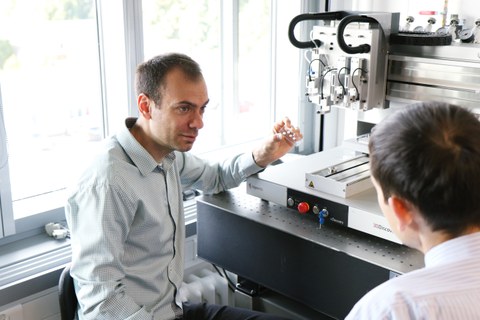Sep 05, 2016
Freigeist Fellowship supports Dr. Ivan Minev in using 3D printing to find ways to repair damage in the human body

Dr. Ivan Minev in front of his 3D printer
Dr. Ivan Minev, research group leader at the BIOTEC/CRTD, has been awarded a Freigeist Fellowship from the VolkswagenStiftung. This five-year, 920.000 EUR grant will enable him to establish his own research team. The ‘Freigeist’ initiative is directed toward enthusiastic scientists and scholars with an outstanding record that are given the opportunity to enjoy maximum freedom in their early scientific career.
Dresden. Electronic tissue technology may soon enable the replacement or repair of damaged human organs. A regenerative surgeon will place a bioelectronic device inside the patient’s body, where it will blend with host tissues and execute a therapeutic program. As a Freigeist Fellow, Dr. Ivan Minev will now investigate technological ways to repair damage in the human body. “The Freigeist Fellowship makes it possible for me to do research on bioelectronic implants that can boost regeneration in the brain. The next 5 – 10 years should give us a good idea of the road-map we need to follow in order to make it happen. I will use soft materials and 3D printing to build functional implants for integration with the central nervous system. Implants will be designed to match the mechanical properties of brain and will emulate aspects of tissue architecture“, Dr. Ivan Minev explains.
Dr. Ivan Minev highly appreciates the advantages Dresden has as a location for science: “The spirit of scientific collaboration is evident everywhere in Dresden. The city hosts the University including many research institutions with their own specific expertise. I was impressed by the idea of the Dresden Concept when I first visited. Getting the various research institutes in Dresden to work together creates a critical mass of expertise which enables interdisciplinary research. This is important for me because in the field of bioelectronics, we need input from both the physical and life sciences and engineering.”
Attracting Dr. Minev to Dresden is a good example of the Dresden Concept and co-operation between several institutes. Jointly BIOTEC, the CRTD, the cfaed (Center for Advancing Electronics Dresden) and the IPF (Institute for Polymer Research) assembled a package of start-up resources so that Dr. Minev could establish his lab at the BIOTEC/CRTD as a research group leader in June 2016. The Freigeist Fellowship validates and enhances this starting platform so that now his team can focus on developing “Electronic Tissue Technologies”. At the École Polytechnique Fédérale de Lausanne (EPFL), Centre for Neuroprosthetics, he worked as a Post-Doctoral Research Associate developing neuroprosthetic implants for the injured spinal cord. He also used mechanically compliant materials and nano-technologies to address challenges in long-term implant biointegration and enabling platforms for multi-modal neuromodulation (2012-2016). His PhD Dr. Ivan Minev earned at the University of Cambridge, Department of Engineering (2008-2012). Within this period he explored materials and technologies for stretchable electronic devices and investigated thin metallic films on elastomer substrates for biomedical applications.
For the Volkswagen Foundation, a ‘Freigeist’ is a young researcher with a strong personality, a creative mind, an ability to identify and use freedom, dedicated to overcoming resistance. A ‘Freigeist’ fellow opens up new horizons and combines critical analysis with imagination and innovative solutions. By thinking ahead the ‘Freigeist’ fellow will act as a catalyst in overcoming existing disciplinary, institutional and even national boundaries. Further information: https://www.volkswagenstiftung.de/nc/en/funding/persons-and-structures/freigeist-fellowships.html
Selected publications
Ivan R. Minev*, Pavel Musienko*, Arthur Hirsch, Quentin Barraud, Nikolaus Wenger, Eduardo Martin Moraud, Tomislav Milekovic, Jérôme Gandar, Marco Capogrosso, Rafael Fajardo Torres, Nicolas Vachicouras, Qihan Liu, Natalia Pavlova, Simone Duis, Léonie Asboth, Alexandre Larmagnac, Janos Vörös, Silvestro Micera, Zhigang Suo, Grégoire Courtine*, Stéphanie P. Lacour*, “Electronic dura mater for long-term multimodal neural interfaces” Science 347(6218): 159-163 (2015)
Daniel J. Chew, Lan Zhu, Evangelos Delivopoulos, Ivan R. Minev, Katherine M. Musick, Charles A. Mosse, Michael Craggs, Nicholas Donaldson, Stéphanie P. Lacour, Stephen B. McMahon, James W. Fawcett. “A Microchannel Neuroprosthesis for Bladder Control After Spinal Cord Injury in Rat”, Science Translational Medicine 5, 210ra155 (2013).
Ivan R. Minev, Pouria Moshayedi, James W. Fawcett, and Stéphanie P. Lacour. "Interaction of Glia with a Compliant, Microstructured Silicone Surface." Acta Biomaterialia , no. 6: 6936-42 (2013).
Media inquiries:
Franziska Clauß, M.A.
Tel.: +49 (0) 351 458 82065
The Biotechnology Center was founded in 2000 as a central scientific unit of the TU Dresden with the goal of combining modern approaches in molecular- and cell biology with the traditionally strong engineering in Dresden. The BIOTEC plays a central role in the “Molecular Bioengineering and Regenerative Medicine” profile of the TU Dresden, fostering developments in the new field of Biotechnology/Biomedicine. The center focuses on cell biology, nanobiotechnology, and bioinformatics. www.biotec.tu-dresden.de
Founded in 2006, the DFG Research Center for Regenerative Therapies Dresden (CRTD), Cluster of Excellence at the TU Dresden has now passed the second phase of the Excellence Initiative which aims to promote top-level research and improve the quality of German universities and research institutions. The goal of the CRTD is to explore the human body's regenerative potential and to develop completely new, regenerative therapies for hitherto incurable diseases. The key areas of research include haematology and immunology, diabetes, neurodegenerative diseases, and bone regeneration. At present, eight professors and ten group leaders are working at the CRTD – integrated into an interdisciplinary network of 87 members at seven different institutions within Dresden. In addition, 21 partners from industry are supporting the network. The synergies in the network allow for a fast translation of results from basic research to clinical applications. www.crt-dresden.de
